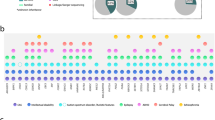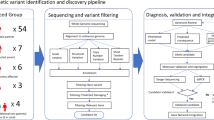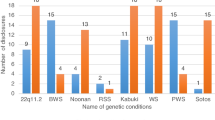Abstract
Rare and typically severe motor speech disorders such as childhood apraxia of speech (CAS) and dysarthria affect about 1 in 1000 children. The genetic basis of these speech disorders is well-documented, with approximately 30% of children who undergo genomic testing receiving an explanatory genetic diagnosis. As more children with speech disorders are offered genetic testing, understanding parental views and experiences around genetic testing for their child is critical in providing effective pre- and post-test genetic counselling. This research explored parental attitudes, experiences, and perceived implications of pursuing genetic testing for their child with motor speech disorder. Semi-structured interviews were conducted with 20 parents of children with CAS or dysarthria who had undergone exome sequencing. Eight parents had received a genetic diagnosis for their child and 12 received uninformative genetic test results. Interviews were transcribed verbatim, co-coded, and analysed using reflexive thematic analysis. Parents were highly motivated to pursue genetic testing for their child’s speech disorder due to the perceived personal, clinical, social, and financial utility in obtaining a genetic diagnosis. Regardless of testing outcome, parents experienced complex emotional responses in receiving their child’s genetic test results. Parents whose child received a genetic diagnosis reported improved access to funding and clinical care; however, they also hoped for ongoing informational, clinical, and peer support in navigating the uncertainty surrounding their child’s rare diagnosis. Conversely, parents who received uninformative genetic test results reported finding meaning in this test outcome, and used emotional-focused and problem-focused strategies to cope with their child’s continued diagnostic odyssey.
This is a preview of subscription content, access via your institution
Access options
Subscribe to this journal
Receive 12 print issues and online access
269,00 € per year
only 22,42 € per issue
Buy this article
- Purchase on SpringerLink
- Instant access to full article PDF
Prices may be subject to local taxes which are calculated during checkout
Similar content being viewed by others
Data availability
Data analysed in the present study can be found within the published article, and in Supplementary File 2. Further data sets associated with this study are available upon request to the corresponding author.
References
Reilly S, McKean C, Morgan A, Wake M. Identifying and managing common childhood language and speech impairments. BMJ. 2015;350:h2318. https://doi.org/10.1136/bmj.h2318.
Morgan A, Ttofari EecanK, Pezic A, Brommeyer K, Mei C, Eadie P, et al. Who to refer for speech therapy at 4 years of age versus who to “watch and wait”? J Pediatr. 2017;185:200–4.e1. https://doi.org/10.1016/j.jpeds.2017.02.059.
Shriberg LD, Kwiatkowski J, Mabie HL. Estimates of the prevalence of motor speech disorders in children with idiopathic speech delay. Clin Linguist Phon. 2019;33:679–706. https://doi.org/10.1080/02699206.2019.1595731.
Cassar C, McCabe P, Cumming S. I still have issues with pronunciation of words”: a mixed methods investigation of the psychosocial and speech effects of childhood apraxia of speech in adults. Int J Speech-Lang Pathol. 2023;25:193–205. https://doi.org/10.1080/17549507.2021.2018496.
Liégeois FJ, Mei C, Pigdon L, Lee KJ, Stojanowski B, Mackay M, et al. Speech and language impairments after childhood ischemic stroke: Does hemisphere matter? Pediatr Neurol. 2019;92:55–9. https://doi.org/10.1016/j.pediatrneurol.2018.11.006.
Liégeois FJ, Morgan AT. Neural bases of childhood speech disorders: Lateralization and plasticity for speech functions during development. Neurosci Biobehav Rev. 2012;36:439–58. https://doi.org/10.1016/j.neubiorev.2011.07.011.
Morgan AT, Masterton R, Pigdon L, Connelly A, Liégeois FJ. Functional magnetic resonance imaging of chronic dysarthric speech after childhood brain injury: Reliance on a left-hemisphere compensatory network. Brain. 2013;136:646–57. https://doi.org/10.1093/brain/aws355.
den Hoed J, Fisher SE. Genetic pathways involved in human speech disorders. Curr Opin Genet Dev. 2020;65:103. https://doi.org/10.1016/j.gde.2020.05.012.
Deriziotis P, Fisher SE. Speech and language: translating the genome. Trends Genet. 2017;33:642–56. https://doi.org/10.1016/j.tig.2017.07.002.
Morgan AT, Amor DJ, St John MD, Scheffer IE, Hildebrand MS. Genetic architecture of childhood speech disorder: a review. Mol Psychiatry. 2024. https://doi.org/10.1038/s41380-024-02409-8.
Eising E, Carrion-Castillo A, Vino A, Strand EA, Jakielski KJ, Scerri TS, et al. A set of regulatory genes co-expressed in embryonic human brain is implicated in disrupted speech development. Mol Psychiatry. 2019;24:1065–78. https://doi.org/10.1038/s41380-018-0020-x.
Hildebrand MS, Jackson VE, Scerri TS, Van Reyk O, Coleman M, Braden RO, et al. Severe childhood speech disorder: Gene discovery highlights transcriptional dysregulation. Neurology. 2020;94:e2148–67. https://doi.org/10.1212/WNL.0000000000009441.
Kaspi A, Hildebrand MS, Jackson VE, Braden R, van Reyk O, Howell T, et al. Genetic aetiologies for childhood speech disorder: Novel pathways co-expressed during brain development. Mol Psychiatry. 2023;28:1647–63. https://doi.org/10.1038/s41380-022-01764-8.
Botkin JR, Belmont JW, Berg JS, Berkman BE, Bombard Y, Holm IA, et al. Points to consider: Ethical, legal, and psychosocial implications of genetic testing in children and adolescents. Am J Hum Genet. 2015;97:6–21. https://doi.org/10.1016/j.ajhg.2015.05.022.
Morgan A, Fisher SE, Scheffer I, Hildebrand M. FOXP2-related speech and language disorder. In: Adam MP, Feldman J, Mirzaa GM, Pagon RA, Wallace SE, Bean LJH, et al., eds. GeneReviews. University of Washington; 2023.
Vears DF, Ayres S, Boyle J, Mansour J, Newson AJ, et al. Human Genetics Society of Australasia Position Statement: Predictive and presymptomatic genetic testing in adults and children. Twin Res Hum Genet. 2020;23:184–9. https://doi.org/10.1017/thg.2020.51.
Crellin E, Martyn M, McClaren B, Gaff C. What matters to parents? A scoping review of parents’ service experiences and needs regarding genetic testing for rare diseases. Eur J Hum Genet. 2023;31:869–78. https://doi.org/10.1038/s41431-023-01376-y.
Alam A, Parfyonov M, Huang CY, Gill I, Connolly MB, Illes J. Targeted whole exome sequencing in children with early-onset epilepsy: Parent experiences. J Child Neurol. 2022;37:840–50. https://doi.org/10.1177/08830738221113901.
Dikow N, Moog U, Karch S, Sander A, Kilian S, Blank R, et al. What do parents expect from a genetic diagnosis of their child with intellectual disability? J Appl Res Intellect Disabil. 2022;32:1129–37. https://doi.org/10.1111/jar.12602.
Zhang Z, Kramer J, Wang H, Chen W, Huang T, Chen Y, et al. Attitudes toward pursuing genetic testing among parents of children with autism spectrum disorder in Taiwan: A qualitative investigation. Int J Environ Res Public Health. 2021;19:118. https://doi.org/10.3390/ijerph19010118.
Ayhan AB, Beyazit U, Topuz Ş, Tunay ÇZ, Abbas MN, Yilmaz S. Autism spectrum disorder and genetic testing: Parents’ attitudes - data from a Turkish sample. J Autism Dev Disord. 2021;51:3331–40. https://doi.org/10.1007/s10803-020-04798-5.
Tremblay I, Grondin S, Laberge A, Cousineau D, Carmant L, Rowan A, et al. Diagnostic and therapeutic misconception: Parental expectations and perspectives regarding genetic testing for developmental disorders. J Autism Dev Disord. 2019;49:363–75. https://doi.org/10.1007/s10803-018-3768-6.
Groisman IJ, Hurlimann T, Godard B. Parents of a child with epilepsy: Views and expectations on receiving genetic results from whole genome sequencing. Epilepsy Behav. 2019;90:178–90. https://doi.org/10.1016/j.yebeh.2018.11.020.
Jeffrey JS, Leathem J, King C, Mefford HC, Ross K, Sadleir LG. Developmental and epileptic encephalopathy: Personal utility of a genetic diagnosis for families. Epilepsia Open. 2021;6:149–59. https://doi.org/10.1002/epi4.12458.
Nevin SM, Wakefield CE, Barlow-Stewart K, McGill BC, Bye A, Palmer EE, et al. Psychosocial impact of genetic testing on parents of children with developmental and epileptic encephalopathy. Dev Med Child Neurol. 2022;64:95–104. https://doi.org/10.1111/dmcn.14971.
Palinkas LA, Horwitz SM, Green CA, Wisdom JP, Duan N, Hoagwood K. Purposeful sampling for qualitative data collection and analysis in mixed method implementation research. Adm Policy Ment Health Ment Health Serv Res. 2015;42:533–44. https://doi.org/10.1007/s10488-013-0528-y.
Zoom Video Communications Inc. Zoom cloud meetings [Computer program]. 2022. https://zoom.us/.
QSR International Pty Ltd. NVivo [Computer program]. March, 2020. https://www.qsrinternational.com/nvivo-qualitative-data-analysis-software/home.
Bernard HR. Social research methods: qualitative and quantitative approaches. Sage Publications; 2013.
Braun V, Clarke V. Using thematic analysis in psychology. Qual Res Psychol. 2006;3:77–101. https://doi.org/10.1191/1478088706qp063oa.
Kohler JN, Turbitt E, Lewis KL, Wilfond BS, Jamal L, Peay HL, et al. Defining personal utility in genomics: a Delphi study. Clin Genet. 2017;92:290–7. https://doi.org/10.1111/cge.12998.
Kohler JN, Turbitt E, Biesecker BB. Personal utility in genomic testing: A systematic literature review. Eur J Hum Genet. 2017;25:662–8. https://doi.org/10.1038/ejhg.2017.10.
Morgan A. Speech-language pathology insights into genetics and neuroscience: Beyond surface behaviour. Int J Speech-Lang Pathol. 2013;15:245–54. https://doi.org/10.3109/17549507.2013.777786.
Solot CB, Sell D, Mayne A, Baylis AL, Persson C, Jackson O, et al. Speech-language disorders in 22q11.2 deletion syndrome: Best practices for diagnosis and management. Am J Speech-Lang Pathol. 2019;28:984–99. https://doi.org/10.1044/2019_AJSLP-16-0147.
Lee W, Luca S, Costain G, Snell M, Marano M, Curtis M, et al. Genome sequencing among children with medical complexity: What constitutes value from parents’ perspective? J Genet Couns. 2022;31:523–33. https://doi.org/10.1002/jgc4.1522.
Martinussen J, Chalk M, Elliott J, Gallacher L. Receiving genomic sequencing results through the Victorian Undiagnosed Disease Program: Exploring parental experiences. J Pers Med. 2022;12:1250. https://doi.org/10.3390/jpm12081250.
Bauskis A, Strange C, Molster C, Fisher C. The diagnostic odyssey: Insights from parents of children living with an undiagnosed condition. Orphanet J Rare Dis. 2022;17:233. https://doi.org/10.1186/s13023-022-02358-x.
Donohue KE, Dolan SM, Watnick D, Gallagher KM, Odgis JA, Suckiel SA, et al. Hope versus reality: Parent expectations of genomic testing. Patient Educ Couns. 2021;104:2073–9. https://doi.org/10.1016/j.pec.2021.01.030.
Lauretta ML, Jarmolowicz A, Amor DJ, Best S, Morgan AT. An investigation of barriers and enablers for genetics in speech-language pathology explored through a case study of childhood apraxia of speech. J Speech Lang Hear Res. 2023. https://doi.org/10.1044/2023_JSLHR-22-00714.
Rosell AM, Pena LDM, Schoch K, Spillmann R, Sullivan J, Hooper SR, et al. Not the end of the odyssey: Parental perceptions of whole exome sequencing (WES) in pediatric undiagnosed disorders. J Genet Couns. 2016;25:1019–31. https://doi.org/10.1007/s10897-016-9933-1.
Poduri A, Sheidley BR, Shostak S, Ottman R. Genetic testing in the epilepsies - developments and dilemmas. Nat Rev Neurol. 2014;10:293–9. https://doi.org/10.1038/nrneurol.2014.60.
Reiff M, Giarelli E, Bernhardt BA, Easley E, Spinner NB, Sankar PL, et al. Parents’ perceptions of the usefulness of chromosomal microarray analysis for children with autism spectrum disorders. J Autism Dev Disord. 2015;45:3262–75. https://doi.org/10.1007/s10803-015-2489-3.
Liang NSY, Adam S, Elliott AM, Siemans A, du Souich C, Causes Study, et al. After genomic testing results: Parents’ long-term views. J Genet Counsel. 2022;31:82–95. https://doi.org/10.1002/jgc4.1454.
Watnick D, Odgis JA, Suckiel SA, Gallagher KM, Teitelman N, Donohue KE, et al. Is that something that should concern me?”: A qualitative exploration of parent understanding of their child’s genomic test results. Hum Genet Genomics Adv. 2021;2:100027. https://doi.org/10.1016/j.xhgg.2021.100027.
Meng Y, Best S, Amor DJ, Braden R, Morgan AT, Goranitis I. The value of genomic testing in severe childhood speech disorders. Eur J Hum Genet. 2024;32:440–7. https://doi.org/10.1038/s41431-024-01534-w.
Acknowledgements
The authors would like to thank all the parents who generously gave their time and insights to participate in this research study.
Funding
This research was supported by National Health and Medical Research Council (NHMRC) Centre of Research Excellence in Speech and Language Neurobiology Grant 1116976 and NHMRC Project Grant APP1127144, awarded to Angela T. Morgan. NHMRC Practitioner Fellowship Grant 1105008 and Investigator Grant 1195955 were awarded to Angela T. Morgan. This study was completed in partial fulfilment of the requirements for the Master of Genetic Counselling programme, the University of Melbourne, Victoria, Australia. This work was also supported by the Victorian Government’s Operational Infrastructure Support Programme.
Author information
Authors and Affiliations
Contributions
ATM, DA, and AJ conceived, designed, and supervised the study. CA and YQL performed data acquisition and analysis, with supervision from AJ. CA, YQL, and ML drafted the manuscript. All authors contributed to the review of the final manuscript.
Corresponding author
Ethics declarations
Competing interests
The authors declare no competing interests.
Ethical approval
This study was approved by the Human Research Ethics Committee of the Royal Children’s Hospital, Melbourne, Australia (reference number: 37353).
Additional information
Publisher’s note Springer Nature remains neutral with regard to jurisdictional claims in published maps and institutional affiliations.
Rights and permissions
Springer Nature or its licensor (e.g. a society or other partner) holds exclusive rights to this article under a publishing agreement with the author(s) or other rightsholder(s); author self-archiving of the accepted manuscript version of this article is solely governed by the terms of such publishing agreement and applicable law.
About this article
Cite this article
Atkinson, C., Lee, Y.Q., Lauretta, M.L. et al. Parental attitudes and experiences in pursuing genetic testing for their child’s motor speech disorder. Eur J Hum Genet 33, 930–936 (2025). https://doi.org/10.1038/s41431-024-01755-z
Received:
Revised:
Accepted:
Published:
Issue Date:
DOI: https://doi.org/10.1038/s41431-024-01755-z



